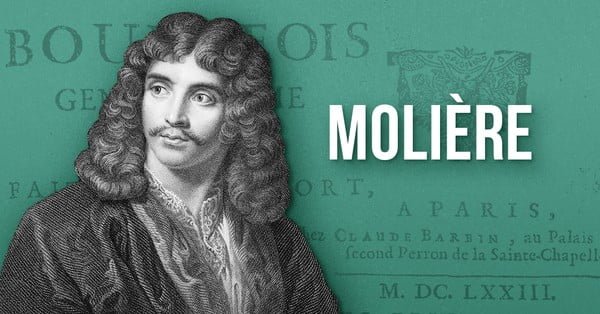Early Life and Education
Molière, born Jean-Baptiste Poquelin on January 15, 1622, in Paris, was the son of a furniture and upholstery maker for the royal court. At the tender age of ten, Molière faced the tragic loss of his mother. Demonstrating early academic prowess, he attended the Collège des Jésuites de Clermont, now known as the Lycée Louis-le-Grand, where Latin was predominantly taught. In 1639, after successfully finishing his studies at the Collège des Jésuites de Clermont, Molière pursued law at the University of Orléans, aligning with his father’s wishes.

Defiance and Theatrical Pursuits
Despite his father’s aspirations for him to follow a similar vocational path, Molière defied familial expectations, passing on his destined career to his younger brother. In 1643, he founded the Illustre Théâtre troupe and adopted the stage name Molière. However, due to financial strains, the troupe disbanded, leading to Molière’s imprisonment. After his release, he and a few dedicated actors toured the French provinces for 13 years. To rival the Italian troupes, Molière began writing his own plays.
Blossoming Career and Masterpieces
Molière penned his first poetic drama, “L’étourdi” (The Folly), in 1655, followed by “Le Dépit Amoureux” (The Discord of Love) a year later. By 1658, his troupe, now renowned in the provinces, performed at the Louvre under the patronage of Duke Philippe, brother to King Louis XIV. His renowned works such as “Le Misanthrope”, “L’école des femmes”, “Tartuffe ou l’imposteur”, and “Aravare ou l’école du mensonge” reflect keen observations on relationships, social morality, and human vices.
Challenges and Lasting Influence
Though celebrated, Molière faced censorship, notably with “Tartuffe,” which criticized nobility and was banned. Despite such opposition, his comedic works gained public acclaim. However, in the early 1670s, health issues and strained royal relations marked his latter years. While performing his final play, “Le Malade Imaginaire” (The Imaginary Invalid), he tragically passed on February 17, 1673.
Enduring Legacy
Molière’s contributions to drama endure, with adaptations of his work and biographical films, including a notable 2007 depiction of his life. Admired for his insights into social nuances and humorous critique of contemporary society, Molière represents the epitome of French theatre and culture, solidifying his status as the ambassador of French literary art to the world.


